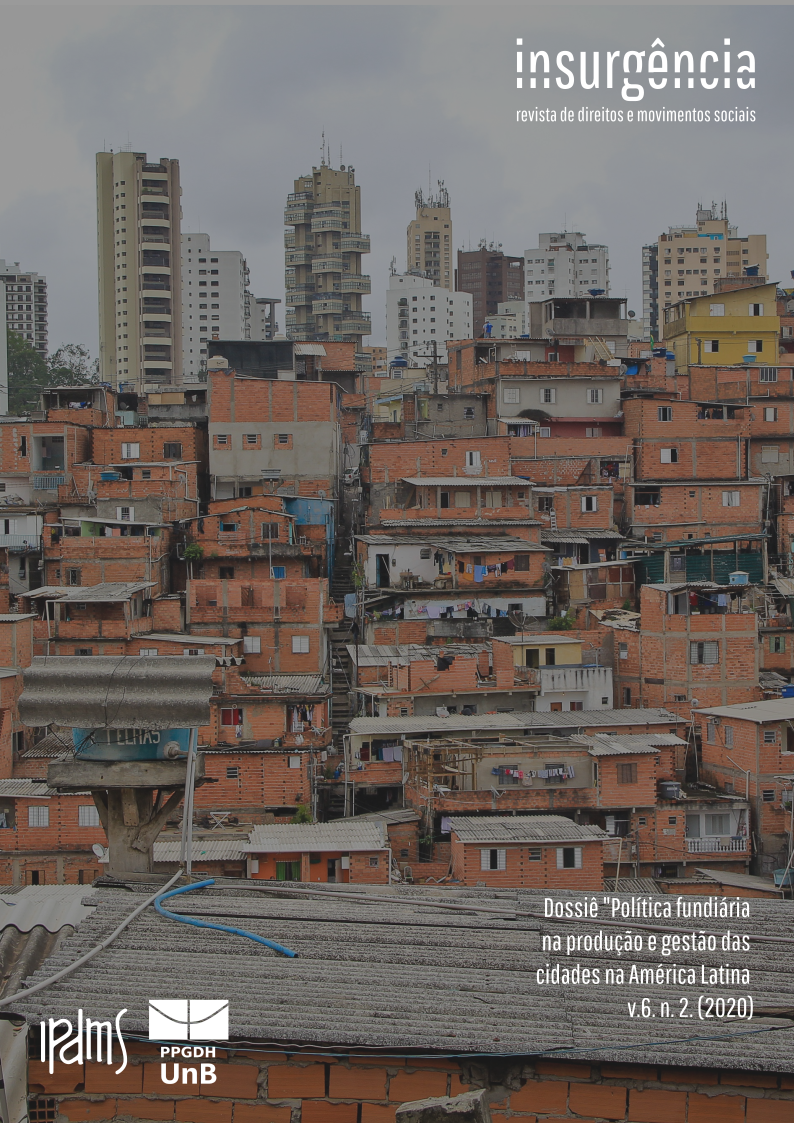É POSSÍVEL EQUACIONAR O PROBLEMA DA POBREZA VIA ECONOMIA DE MERCADO?
A política de formalização da propriedade imobiliária em Hernando de Soto
DOI:
https://doi.org/10.26512/insurgncia.v6i2.32196Keywords:
Land regularization, Hernando De Soto, informality, slums, favelasAbstract
This paper describes and makes a critical analysis on the conception of land tenure policy held up by the Peruvian economist Hernando De Soto. It aims to construe De Soto’s point of view, which is based on the formalization of urban poor’s real estates in the undeveloped nations. In that point of view, land formalization is seen as a strategic tool to alleviate the poverty and to make capitalism well succeed among those nations. Along the paper is cleared that, despite his critics on mainstream thinking, De Soto never abandons the classical Economy fundamental topics and that he tries to find a capitalistic answer to social claiming. This way capitalism could be empowered and that would avoid its disruption. Besides, the paper debates some theoretical and political consequences of De Soto’s thinking, in order to call the attention to results of the policies like these proposed by him. Some theoretical hypothesis about the meaning of Latin American existing land regularization policies are built based on the analysis of De Soto’s theories. An example could be that which see a relation between these current policies and the struggles among several capitalist agents, who act in different scales, by the ruling of increasing market parts.
References
ABRAMO, Pedro. A teoria econômica da favela: quatro notas sobre a localização residencial dos pobres e o mercado imobiliário informal. In: ______ (org). A cidade da informalidade: o desafio das cidades latino-americanas. Rio de Janeiro: FAPERJ / Sette Letras, 2003. p. 189-223.
ANDRADE, Maria Isabel de Toledo. Direitos de propriedade e renda pessoal: um estudo de caso das comunidades do Caju. Revista do BNDES, Rio de Janeiro, v. 13, n. 26, p. 261-274, dez. 2006.
BATISTA JR., Paulo Nogueira. O Brasil e a economia internacional: recuperação e defesa da autonomia nacional. Rio de Janeiro: Campus/Elsevier, 2005.
CASTEL, Robert. A insegurança social: o que é ser protegido? Rio de Janeiro: Vozes, 2005.
CLICHEVSKY, Nora. Pobreza y acceso al suelo urbano: algunas interrogantes sobre las políticas de regularización en América Latina. Santiago de Chile: Nações Unidas / CEPAL / División de Desarrollo Sustenible y Asentamientos Humanos, 2003.
DE SOTO, Hernando. Economia subterrânea: uma análise da realidade peruana. Rio de Janeiro: Globo, 1987. Tradução de El otro sendero: la revolución informal.
______ . O mistério do capital: por que o capitalismo dá certo nos países desenvolvidos e fracassa no resto do mundo. Rio de Janeiro: Record, 2001.
DURAND-LASSERVE, Alain. Regularization and integration of irregular settlements: lessons from experience. Nairobi (Kenya): UNDP/UNCHS (Habitat)/World Bank, 1996. Assisted by Valérie Clerc.
ENGELBRECHT, Daniel. Escritura traz renda maior para morador de favela no Rio: estudo defende a regularização fundiária para reduzir pobreza. O Globo, 2. ed., Rio de Janeiro, 03 dez 2006. Caderno Rio, p. 37.
FERNANDES, Edésio. La influencia de El mistério del capital de Hernando de Soto. Land Lines, Cambridge (Massachussets, EUA), v. 14, n. 1, jan. 2002. Disponível em: < http://www.lincolninst.edu/pubs/PubDetail.aspx?pubid=760>. Acesso em: 15 out. 2006.
GILBERT, Alan. On the mystery of capital and the myths of Hernando de Soto: what difference does legal title make? International Development Planning Review, Londres, v. 24, n. 1, p. 1-19, fev. 2002. Formerly Third World Planning Review.
HOLSTON, James. Legalizando o ilegal: propriedade e usurpação no Brasil. Revista Brasileira de Ciências Sociais, São Paulo, v. 8, n. 21, p. 68-89, fev. 1993.
O'DONNELL, Guillermo. Teoria democrática e política comparada. Dados ”“ Revista de Ciências Sociais, Rio de Janeiro, v. 42, n. 4, p. 577-654, 1999.
RIOFRÃO, Gustavo; CORZO, Daniel Ramírez. Land titling: a path to urban inclusion? Policy and practice of the peruvian model. In: N-AERUS CONFERENCE, 2005, Lund (Suécia). Urban Observatory Desco, set. 2005. Disponível em: <http://www.naerus.net/sat/workshops/2005/papers/32.pdf>.
THE WORLD BANK. Housing: enabling markets to work. Washington (D. C.), 1993.
WACQUANT, Loïc. A "underclass urbana" no imaginário social e científico norte-americano. In: ______ . Os condenados da cidade: estudo sobre marginalidade avançada. Rio de Janeiro: Revan, 2001.
Downloads
Published
How to Cite
Issue
Section
License
Copyright (c) 2020 InSURgência: revista de direitos e movimentos sociais

This work is licensed under a Creative Commons Attribution-NonCommercial-NoDerivatives 4.0 International License.
Creative Commons Atribuição-NãoComercial-SemDerivações 4.0 Internacional.
















